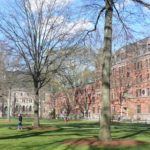What is WashU in St. Louis Known For?
What’s Covered:
- Overview of WashU in St. Louis
- Unique Aspects of WashU
- What are Your Chances of Acceptance at WashU?
It’s hard to discuss Washington University in St. Louis without first mentioning its confusing nomenclature; named after George Washington, the school is sometimes mixed up with the University of Washington in Seattle, Washington. For the sake of clarity, many refer to Washington University in St. Louis as either “WashU” or “WUSTL.” Whatever you call it, WashU is known for its exceptional academics—it consistently ranks in the top 20 national universities—and its devotion to the betterment of its students.
Overview of WashU in St. Louis
Location: St. Louis, Missouri
Undergraduate Enrollment: 8,220
Acceptance Rate: 12%
Middle 50% SAT: 1500-1570
Middle 50% ACT: 33-35
WashU has a reputation for protecting its yield by outright rejecting strong applicants who admissions officials suspect may consider the school their “safety” option. One way that applicants with exceptional profiles and a strong desire to attend WashU can demonstrate their commitment is by applying Early Decision or Early Decision II.
The supplemental essay is another way to assuage any leery admissions officer’s concerns—consequently, the school places a great deal of significance on both it and the Common App essay. Effective essay topics demonstrate deep academic passion and extracurricular experiences that support those interests, while highlighting a student’s fit with the campus culture and values.
Unique Aspects of WashU
What’s WashU known for? For one, it is recognized as one of the best colleges in the country. The school is referred to in some circles as a “Hidden Ivy,” or a school with exceptional academics, challenging admissions, and unique student experiences. In some cases, WashU even surpasses the high standards set by its Ivy League counterparts.
Academics
WashU offers over 100 fields of study—from Accounting to World Music, Dance, and Theater—through its four undergraduate schools:
- College of Arts & Sciences
- Olin Business School
- Sam Fox School of Design & Visual Arts
- McKelvey School of Engineering
The largest of the undergraduate schools is the College of Arts & Sciences, due to the enormous popularity of WashU’s Pre-Med program and the respect it has garnered nationally. General chemistry is one of the most popular classes at WashU and is notable for its ability to weed out students not up to the rigorous Pre-Med program.
Despite demanding academics and intense coursework in programs such as Pre-Med, WashU retains a supportive and non-competitive academic environment. WashU isn’t as cutthroat as other prestigious schools, but it asks a lot of its students. In 2016, Business Insider ranked the school 13th on its list of the 30 most intense colleges in America. Pre-Med isn’t the only STEM-focused undergraduate program at WashU, though; the McKelvey School of Engineering has the second-largest undergraduate enrollment.
In recent years, WashU’s reputation for entrepreneurship has grown. Entrepreneur magazine ranked the university as the fifth-best college in the country for aspiring entrepreneurs, thanks to its interdisciplinary approach, vast networking opportunities, and hands-on learning experiences, including fellowships, student-run businesses, and competitions.
Extracurriculars
What is WashU known for? Academics, obviously, but the school has a sneakily great athletics scene as well. The Bears have won ten NCAA Division III women’s volleyball championships and five women’s basketball championships. The men are no slouches either, winning back-to-back basketball championships in 2008 and 2009.
Even if you’re not a big-time athlete, sports are an important part of culture on WashU’s campus, with about 75% of the undergraduate student body playing on one of the college’s intramural teams. The school also has more than 40 sport-focused clubs.
If athletics aren’t your thing, there are more than 400 undergraduate student groups on campus encompassing all types of interests, ranging from The Burning Kumquat—the student-run organic garden—to Mama’s Pot Roast—the school’s longest-running improv group.
Another popular extracurricular activity is Student Life, or as it’s affectionately known on campus, StudLife. One of the oldest college newspapers (it made its debut in 1878), StudLife is staffed by 26 undergraduate editors and many other staff contributors. The annual February Sex Issue is a must-read and features the results of a campus-wide sex survey along with body-positive photos.
Traditions
Over the years, WILD (an acronym for Walk In, Lay Down) has evolved from a movie screening at Brookings Hall to a musical festival and the largest student-run event at WashU. Normally headlined by local bands and artists, big-name stars like Childish Gambino, All-American Rejects, and T-Pain will occasionally take the stage.
First Year Finale is another popular tradition at WashU. The event allows first-year students to reflect on their experiences and recognize the members of the university community who contributed to their success.
Dorms
WashU continues to gain recognition for its high-quality dorms—many students find them nicer than their rooms at home, which is saying something for a student body that skews as wealthy as WashU’s. The university consistently places at, or near, the top of lists ranking the best college dorms in America. Interested in learning more about WashU’s dorms? We’ve got the scoop from a former student.
Financial Aid
WashU has a reputation for having a lack of socioeconomic diversity; according to a 2017 New York Times story, it has more students from the top fifth in median family income than all the other 2,395 included colleges. Since that time, WashU has adopted a need-blind admissions policy, which means the university doesn’t consider an applicant’s ability to pay when making an admissions decision.
WashU will meet 100% of the demonstrated need of admitted students and has no-loan financial aid packages for all students. Students from Missouri and Southern Illinois from families with annual incomes of $75,000 or less have their tuition, fees, housing, and food covered by the WashU Pledge.
Resources
Research plays a considerable role in the lives of many WashU undergraduates, with roughly 60% of students in the College of Arts & Sciences involved in research. The school maintains an Office of Undergraduate Research to help facilitate undergraduate research experiences and connect students to mentors and opportunities.
The Mildred Lane Kemper Art Museum is part of the Sam Fox School of Design & Visual Arts and one of the oldest teaching museums in the country, dating back to 1881. It’s also one of the nation’s most distinguished university collections, housing works from artists such as Pablo Picasso and Jackson Pollock.
Location
The “WashU Bubble” is real. Because the school does an excellent job of meeting students’ needs and keeping them busy with coursework, some students never fully explore the surrounding city of St. Louis.
Students who do escape campus will discover that the city is very affordable and offers a plethora of free activities, including everything at Forest Park, where you’ll find museums, a zoo, trails, and an abundance of open space.
Another appealing aspect of St. Louis for career-minded college students is the numerous big-name businesses that call the city home, including TD Ameritrade, Anheuser-Busch, and other corporations across various industries. Students in St. Louis also love the fact that the city has four seasons.
What are Your Chances of Acceptance at WashU?
WashU is a selective school that a lot of college-bound students are anxious to get into; they received nearly 33,000 applications for the class of 2029, with 86% of admitted students in the top 10% of their high school class. If an applicant fails to meet WashU’s strict academic standards, there’s a chance admissions officers will not look at the rest of their application. Extracurricular activities can boost an applicant’s odds of acceptance, especially when they align with academic interests.
CollegeVine’s free admissions calculator can help applicants better understand their chances of getting into WashU. Our free chancing engine uses metrics like GPA and standardized test scores, along with extracurricular activities, to estimate your odds of acceptance. It also spotlights areas where you can improve your profile.



